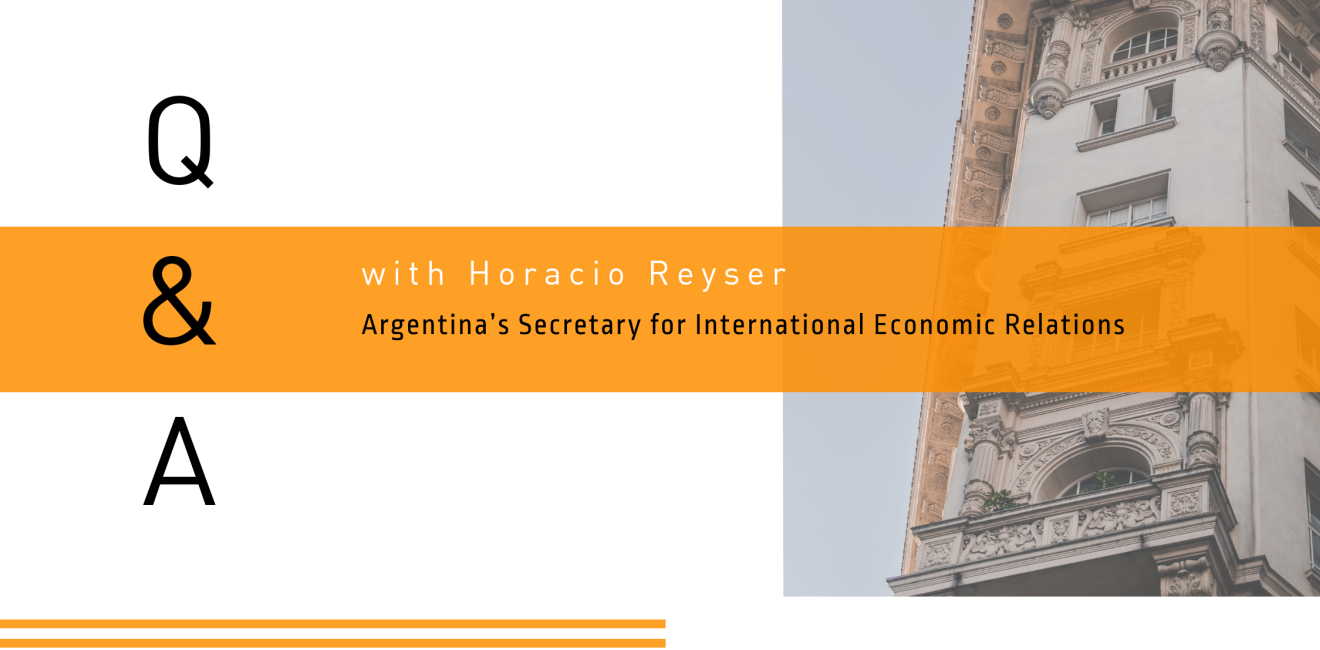English | Español
Q: According to a 2018 Pew Research Center survey, only 54 percent of Argentines believe that expanding trade with other countries is good for the economy. This is the lowest number among the 27 countries in advanced and emerging economies included in the survey. With so much skepticism, do you think an FTA with the EU will help or damage the image of the Argentine government? How is it possible to promote a different view of international trade in Argentina?
A: In Argentina, there is a widespread and erroneous vision that associates international trade with deindustrialization and job loss. This perception ignores the benefits that international trade has brought to developed countries and overlooks the fact that there are no success cases of countries isolated from global trade.
Nevertheless, this somewhat anachronistic perception is changing. I am convinced that the agreement with the EU strengthens the positive image of our government because it is a historical partnership, which creates a market of 800 million consumers. That will increase export opportunities for Argentine products. Also, with the removal of tariffs, Europeans will demand more Argentine products, which implies more companies, more production, more workers, more investment, more SMEs.
All of this allows us to see the differences with the previous model, that of a closed Argentina, isolated and inefficient. The contrast is clear. The agreement had massive support across the Argentine population, which shows that Argentines are no longer seeing the world as a threat and beginning to perceive it as an opportunity.
The way to promote a different vision is to show results. For example, Mercosur used to generate a lot of skepticism because it was not a useful tool. But today it has seen reinvigorated thanks to its improved efficiency, pragmatism and ability to negotiate with the world, asserting the interests and needs of our country. The agreement with the EU is going to provide order to the economy and will be the key to modifying this outdated vision of international trade. Integration with the world is one of our primary goals as a government, which radically contrasts with the priorities of the previous government.
Q: The agreement between Mercosur and the EU is now part of the presidential campaign, with President Mauricio Macri characterizing it as “the most important agreement we have signed in our history.” Meanwhile, the candidates of the opposition have criticized the agreement harshly. Alberto Fernández, for example, said that “such an agreement generates nothing to celebrate, but many reasons to worry.” Do you think this debate is an important factor for voters ahead of the presidential elections?
A: Without a doubt it is a significant debate. It is true that the opposition candidates criticized it at first, but after the terms of the agreement were disseminated –making it clear that the EU made concessions that it did not grant to any other commercial partner, such as periods of up to 15 years before beginning the tariff reduction – they had a much more prudent position.
We must remember that this negotiation took more than 20 years, and five different administrations worked on it. That consensus can’t be denied. I think the criticism from the opposition is opportunistic because the previous government also tried to advance the agreement with the EU, although it did not succeed. In this sense, it is also important to bear in mind that a large share of the goods that were negotiated during the past three years were initially proposed by the previous government.
Indeed, I consider this an important issue because it presents us with a debate as a society. It makes us consider: What country do we want to be? A normal country, integrated into the world, and incorporated into global value chains, or an isolated country, whose only international partners are authoritarian nations? We are convinced that the public is very aware of this debate and does not want to go back to the past.
Q: The Mercosur-EU agreement is part of a series of achievements in foreign policy of the government of Mauricio Macri, including hosting the G-20 summit, the IMF bailout and the support of the United States for its membership in the OECD. With the hard recession and high levels of inflation and unemployment, do you think the people recognize these achievements and give them importance?
A: Absolutely. I think that the public opinion has understood that, despite the economic difficulties we have gone through, we were able to lay the foundations for a healthy economy: we reversed a structural and historical deficit, we renewed key sectors such as energy, we provided institutional quality, and we improved security, among many other achievements.
Among these issues that voters value, without a doubt, international engagement is appreciated. Today, our president is recognized and respected by his peers around the world. To a large extent, the agreement with the EU was due to his personal leadership and his excellent relations with other leaders.
My perception is that the electorate does not want to go back on this issue, and that it is one of the topics that will define their vote.
Q: There is no consensus among the business chambers regarding the Mercosur-EU agreement, with some chambers in favor, such as the Argentine Rural Society, and others strongly against it, such as the Assembly of Small and Medium Employers. With the FTA, are there going to be winners and losers? In this case, what measures will be necessary to encourage business owners to adapt and innovate in order to compete in global markets? What do you do with workers in industries that will suffer from trade liberalization?
A: Myself and the rest of the officials involved in the negotiation had regularly meetings with all sectors, both private and civil society, before closing the agreement and afterwards. The great majority are very satisfied and hopeful about the agreement, because it takes into account our specific needs, and has concrete tools to deal with industries that will be exposed to competition.
Therefore, I believe that we should not talk about winners or losers, but rather that there will be a general benefit throughout the economy. The winner is the country, the economy, which will be in much better shape, it will be more competitive, it will generate more employment, and it will attract more investment.
This will be possible, of course, because the agreement is only the starting point to a series of structural reforms that address the tax, labor, and logistics spheres, among others, that will make our economy more competitive. The agreement, in this way, presents us with a clear horizon. For this, the Ministry of Production will continue to carry out programs to boost the productivity and competitiveness of our companies, as it has been doing since 2016.
Argentina will obtain the maximum benefit of the agreement with the EU if it promotes the insertion of its most competitive sectors, while assisting the most exposed sectors so that, within 10 to 15 years, when the tariff reduction begin, these sectors will be able to compete internationally.
These time lines, greater than 10 years (the limit recommended by WTO rules for regional free trade agreements), the slower tariff reduction, and the higher percentage of trade excluded from the Mercosur agreement are the result of a “special and differentiated treatment” that recognizes the differences in the degree of development of the economies.
Q: Given that the legal process of translation and revision of the agreement will take at least six months, the legislative approval of the agreement will very likely depend on the Congress after the October elections. How do you see the negotiation process with other political parties? Do you see the FTA signed with Chile serves as the starting point for the negotiations?
A: I think that, as this agreement with the EU has basically been a national policy throughout five presidential administrations, the parliamentary ratification process will not be complicated.
Some criticisms that appeared since the closing of negotiations must be understood in the context of the electoral campaign.
I am convinced that the agreement with the EU is not the decision of a specific party or coalition, but of the whole country, and that it is an irreversible process. The expansion of the agreement with Chile, in spite of its differences, could well be taken as a trial exercise to understand that when it comes to national policies, such as integrating ourselves into the world, the natural thing is that all sectors agree.
However, the partnership with the EU is only the starting point. Beyond this agreement, Argentina’s foreign policy agenda remains very active on other fronts. In the context of Mercosur, we have had meetings with Canada, South Korea, EFTA, Singapore and Vietnam in recent months. In all these cases, we are moving fast to negotiate new agreements, and I believe that the success achieved with the European Union will give us the momentum we need to be able to do so quickly.
Author


Argentina Project
The Argentina Project is the premier institution for policy-relevant research on politics and economics in Argentina. Read more

Explore More
Browse Insights & Analysis
360° View of How Southeast Asia Can Attract More FDI in Chips and AI



